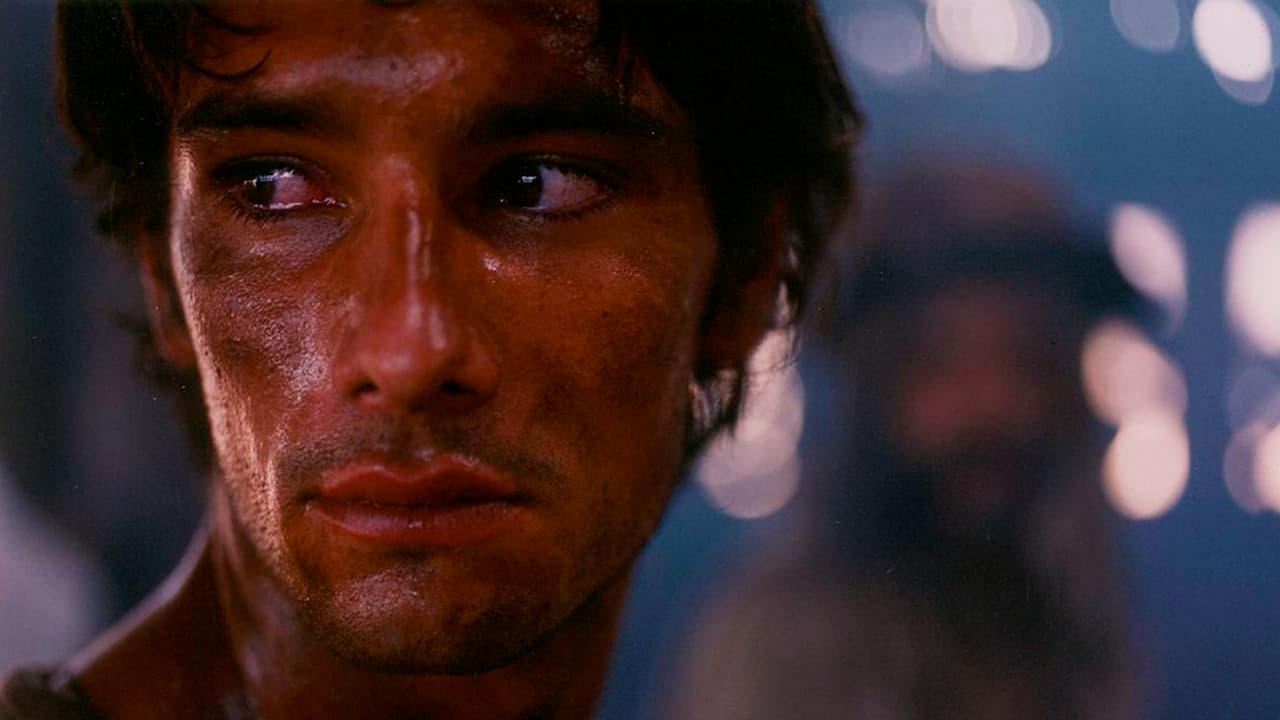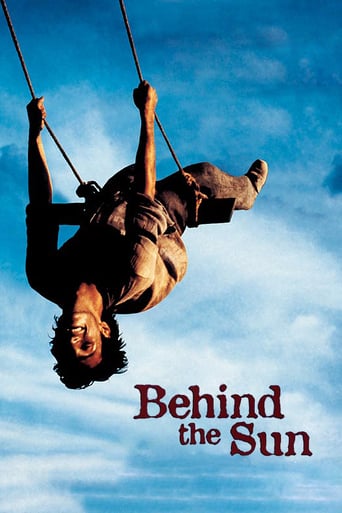

'Behind The Sun' finds itself rather lost in its' own imagery -- albeit very lovely imagery. It is undeniable that the film is beautifully shot but I think that the story, at times, is left a little blank. It left me wanting a lot filled in... I was burning with questions that essentially were left unanswered.Sometimes that is an artistic way of presenting a film but in this case it was just annoying. I think the director was trying to communicate much of the story without words but was not doing that excellent of a job of it.However, the acting is outstanding and the dialogue is impressive. They're the backbone of the film.The setting felt limited and at times stuffy... But by and large, the beautiful cinematography and the quality dialogue made up for the lack of the rest. Worth a watch.
... View MoreHollywood rarely has the courage to produce films such as this small masterpiece. From the plot to the acting to the cinematography, this is one of the finest films I've seen in 60 years of appreciating cinema. This is a slow paced film, but don't let that put you off. In fact, don't even think "slow paced." Instead, expect a harmonic blend capturing the life, times, and spirit of the hardworking people who populate the story. Attempting to scratch out an existence milling sugar cane, these farmers in Brazil's rural outback (the film is set in 1910) are caught up in a land-squabble-based blood feud that's apparently gone on for decades. Not only is everything about the film superb, but the surprising yet completely logical twist that climaxes the story provides a remarkable take on "family honor" - a take that lets us know that seeing value in the lives of others can sometimes come from unexpected places. Makes for hours of fascinating discussion; the kind of film that makes one THINK.By all means, see it!
... View MoreThis movie starts with a blood-stained shirt hanging under a strong wind. We will learn, later on, that it belongs to the eldest son of a small rural farmer (the Breves) in the drought-plagued, sun-drenched, desperately poor Northeast region of Brazil. He was killed in an ambush by a member of another family, the Ferreiras, starting a feud (which in the past -- the year is 1910 -- was very common in this region and could last for decades). Vengeance is required by the rough peasant's honor system, but a truce period is dictated by the slow yellowing of the blood stains under the sun.One of the things that are extraordinary in this gorgeous movie is the way we learn all this. The slow tempo of images, their rough poetic beauty, with an eerie musical background, tells everything we must know without words, but with skillful dramatic suspense. A lot of symbolism is also present: for instance, the sugarcane mill operated by the Breves family is powered by a pair of bulls walking endlessly around. The family patriarch is behind them all the time, forcing with a whip and shouts their round about. The oxen are so used to it that when the yoke is removed at the end of the day, they continue marching by their own around the mill! So, this is an apt metaphor for the routine, yoked, forced existence of the family under the weight of the father's authority and of tradition, an existence they see as a kind of inescapable karma.The remaining eldest son of the Breves (played superbly by Rodrigo Santoro) must now exact revenge on his dead brother. There is no way out, so, reluctantly, he does just that and kills the eldest son of the Ferreira family in a dramatic sequence, one of the best filmed I ever saw. He knows now that he will have a truce, too, until the bloodied shirt of his enemy yellows. His life is now divided into two, as the blind patriarch of the Ferreira clan tells him: the 20 years he has lived so far, and a week or so he still has to live, because death will surely come and he cannot dishonor his family by running away. The mutual killing cycle will so be like their bleak lives and the oxen's. It will be like two serpents eating each other tails until nothing remains, just a pool of blood (another touching metaphor described by one the characters). He has never known love, and will never know. April, the month when all this happened, was torn up (the meaning of the title in Portuguese, which was disgracefully altered in the English title).The film's ambiance alternates between blinding sun and the dried up "caatinga" (the semi-arid plains typical of this region) and the darkness of the night, lighted only by primitive oil lamps and candles. Night always bring respite and rest, to the oxen as well as to the humans, but it also brings fear. The eldest son wants to escape from this life, to interrupt the oppressing lifestyle, to revolt against the symbol of all this, his father, and to stop the revenge cycle. He doesn't know how, but the sudden appearance of a two-person circus in the village changes everything. The metaphor is now apparent: a beautiful girl shows him that love is possible, that a new life elsewhere is possible, that there are many other things beyond his narrow horizon of poor peasant. His young brother gets a book as a gift from the girl and this opens up marvelous, fascinating storytelling and daydreaming, of constructing a new reality where the boy is hero and is desired, with a plot he can change at his will. Both brothers see a light at the end of the tunnel, a dark passage to a brighter day.The movie paces up now to a climax that everybody is able to feel, the characters as well as the audience. The assassin is coming for him, the shirt stains have finally yellowed. Night falls and he meets for the first time his love. Heavy rain starts, a new metaphor, because it is so rare and so unexpected. Will this mean that there will be a way out for him, a meeting of a new life and world, a blossoming of life like the one is brought by rain in this parched land? How can he escape without dishonor to his family, without having to kill again?The answer is at the same time simple and fully symbolic, too. I will not spoil the surprise, but I must say that is absolutely impressive and emotion-laden. When you see the film, you will understand the solution to this impasse, painful for some, liberating to others.This is another triumph for young director Salles and his team, one of the best of the new breed of Brazilian cinema directors. His previous international success, "Central do Brasil" was excellent, too, and very properly incensed by critics and public alike. "Motorcycle Diaries" is also another movie by him, very well received. But "Abril Despedaçado" belongs to the rare category of a true masterpiece.
... View MoreUtter brilliance, the most beautiful movie I've seen since Amelie from Montmartre. How this movie is fairly unknown is a mystery to me.I cried repeatedly through the latter half of the movie. Not from the sadness in the story, but from the beauty of it. Not many movies leave such marks, me and the person I watched it with talked about it for hours after seeing it.I'm shocked to see this movie "only" got 7.5 here on IMDB. It deserves WAAY more. I would expect it to be around the 8.5 mark. 10/10 from me though, I'm blown away.
... View More